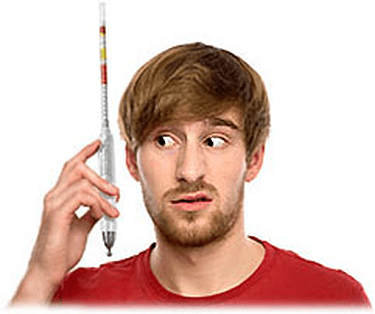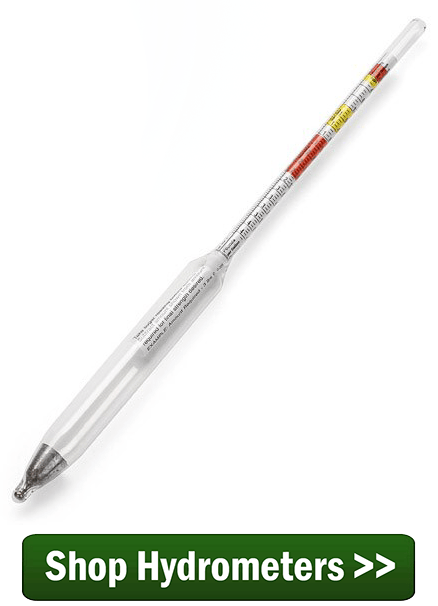 The one piece of winemaking equipment most often missing in the beginning winemaker’s arsenal is the wine hydrometer. Yet, it is probably the most valuable piece of equipment they could have. A wine hydrometer can tell you:
The one piece of winemaking equipment most often missing in the beginning winemaker’s arsenal is the wine hydrometer. Yet, it is probably the most valuable piece of equipment they could have. A wine hydrometer can tell you:
- How much sugar you need to add to your wine, if any
- How much alcohol your wine will have when it’s done
- How far along your wine’s fermentation has gotten
- If your wine’s fermentation is progressing, or if it’s stuck
- If your fermentation has finished or only looks like it has
- And above all, a wine hydrometer can give you piece of mind
If you’re not sure what your wine’s doing, take a reading with a wine hydrometer, and you’ll know. To sum it up, the hydrometer is just as important to the winemaker as the compass is to the sea captain. Without it you’re just guessing as to where your fermentation’s at, and more importantly, you’re guessing as to where it’s going.
After helping countless home winemakers, we’ve found that the #1 reason that a beginning winemaker does not use a wine hydrometer is because it either looks too complicated, or it’s too intimidating.
Just like when some people’s eye glaze-over at the mere mentioning
of math, some beginning winemakers shudder at the
thought of using a wine hydrometer.
This is really a shame, and I’ll tell you why. A wine hydrometer is no more complicated to use than an everyday thermometer, and it’s even quicker.  With a wine hydrometer, you can take a reading instantly by seeing how high or low it floats in your wine. That’s it! No waiting around for it to react or to come up with a reading. Wherever the surface of the wine crosses the scale on the gravity hydrometer is how you determine your reading. Here more on taking wine hydrometer readings.
With a wine hydrometer, you can take a reading instantly by seeing how high or low it floats in your wine. That’s it! No waiting around for it to react or to come up with a reading. Wherever the surface of the wine crosses the scale on the gravity hydrometer is how you determine your reading. Here more on taking wine hydrometer readings.
I think if more beginning winemakers understood that that’s all there is to using a wine hydrometer, more of them would use one. With so much information to gain about a wine by its use, it almost seems silly not to use it.
If you would like to read a little more about the wine hydrometer there’s a short, straight-forward article on our website titled, “Getting To Know Your Hydrometer.” It covers the use of the wine hydrometer in a little more detail.
—–
Ed Kraus is a 3rd generation home brewer/winemaker and has been an owner of E. C. Kraus since 1999. He has been helping individuals make better wine and beer for over 25 years.

a wine hydrometer is the best peace of
equipment to making good wine
I made the first bash of wine, bad I was not happy with the reading on the wine hydrometer and added a solution of sugar to the juice and then I noticed that the fermentation stopped, what can I do to start fermentation again?
Heinz, there are lots of reasons why a fermentation will not start or continue. I suggest that you go over the article: "Top 10 Reasons For Fermentation Failure" at the following link on our website: http://www.eckraus.com/wine-making-failure/
When you say that you were not happy with the ending reading on your wine hydrometer, that tells me that there may be some confusion going on there. Please realize that the alcohol reading you get at the end of fermentation is not the current alcohol level of the wine, it’s the "potential" alcohol of the wine. See the article, "Hydrometer Scales And What They Mean" http://www.eckraus.com/wine-making-hydrometer-scales/
I own a hydrometer, and was unable to use in some mango must, it was too thick. What can I do to be able to take readings in a thick (heavy) must?
Francis, I am going to make an assumption here and say your mango juice it thick with pulp or fiber. If this is the case, you can let the juice sit until you can get enough clear juice off the top to take a reading. The other method you can try is to dilute a sample of the juice: half water / half juice. Take a wine reading and times it by two. For example: if the specific gravity reading 1.040, then the real SG is 1.080.
Thanks to all your posts about wine hydrometers and wine making im almost ready to try my first batch of wine. Probably apple…tis the season. Im just confused on one thing. You mention testing the wine throughout the process to see if fermentation is finished but its in the airlock. Do you leave the hydrometer in the carboy or is it ok to open and test it? Thanks for the help
Heather, it is perfectly fine to take the airlock off the fermenter while the fermentation is still active. Any air you allow into the fermenter will be quickly pushed out by CO2 gas. Even a slow fermentation creates quite of bit of gas.
Hi. I have been following your blogs and site and am in the process of making my own wine. I am at 4 weeks today minus 3 days for rapid fermentation. My bubbler is once every two min’s – I took the hydrometer reading today and its at the 10 just under 1.000. We are making a white wine that is like a pino grigo – do you think it is time for raking? Or should I wait till it is at the 1.030 like you suggested.
Ashley, your fermentation has already based the 1.030. It is going the other direction. The fermentation will end up just above the 1.000 you mentioned. To answer your question, I would recommend racking the wine at this point. It’s important to get it off all that excessive sediment.
I DID NOT HAVE A WINE HYDROMETER BEFORE I STARTED MY PLUM WINE BUT NOW IT READS 1% HOW DO I KNOW WHAT I STARTED OUT WITH?
Can a refractometer be used in place of a hydrometer?
Jason, if the refractometer has a specific gravity scale, then yes you can use it to track the fermentation progress. Brix will not accurately represent sugar percentage after alcohol is present.
Refractometer
http://www.eckraus.com/refractometer-specificgravity-brix.html
Thank you. I also made a fruit wine and the must was to thick to get a reading. fortunately i had the fruit in a bag so i was able to move the bag out of the way tilt my primary bucket and get a reading. How accurate i was is another issue but i can deal with it.
Thank you for all the blogs, they really help me out allot
how much wine do you put in the test jar to take a hydrometer reading.
Larry, you just need to add enough liquid so that the hydrometer can float freely.
I am really thrilled by the wealth of information I gained from the discussions. We run a medium-sized spirits and winery processing company in Nigeria. I have always thought about, what is the difference between alcohol meter and wine-hydrometer? I went to a shop to buy a hydrometer but they could not explain the usage, please advise on the proper reading?
Eugene, there are wine and beer hydrometers that have scales like specific gravity, potential alcohol and brix. The alcohol hydrometers, are not for use on wine and beer. They are for telling the alcohol content on distilled spirits such as whiskey or vodka. I hope this answers your question. For more information, below are links to the product page for both types of hydrometers.
Alcohol Hydrometer
http://www.eckraus.com/alcohol-hydrometer.html
Triple Scale Hydrometer
http://www.eckraus.com/triple-scale-hydrometer.html